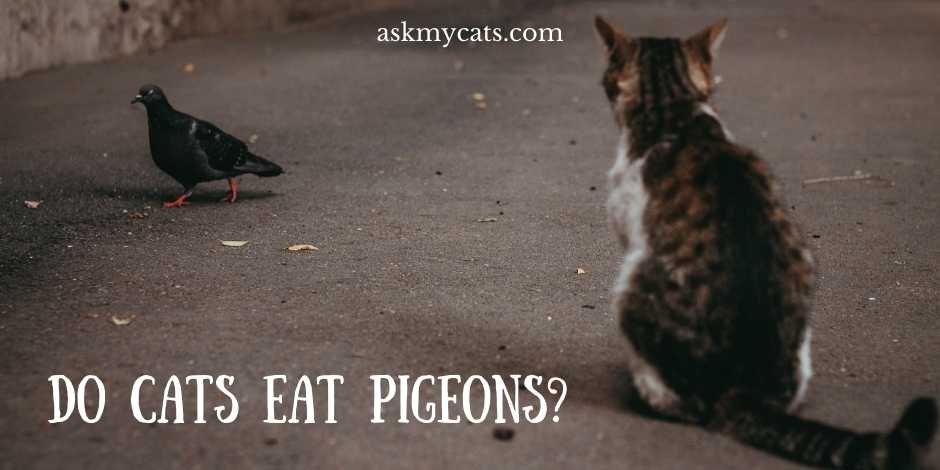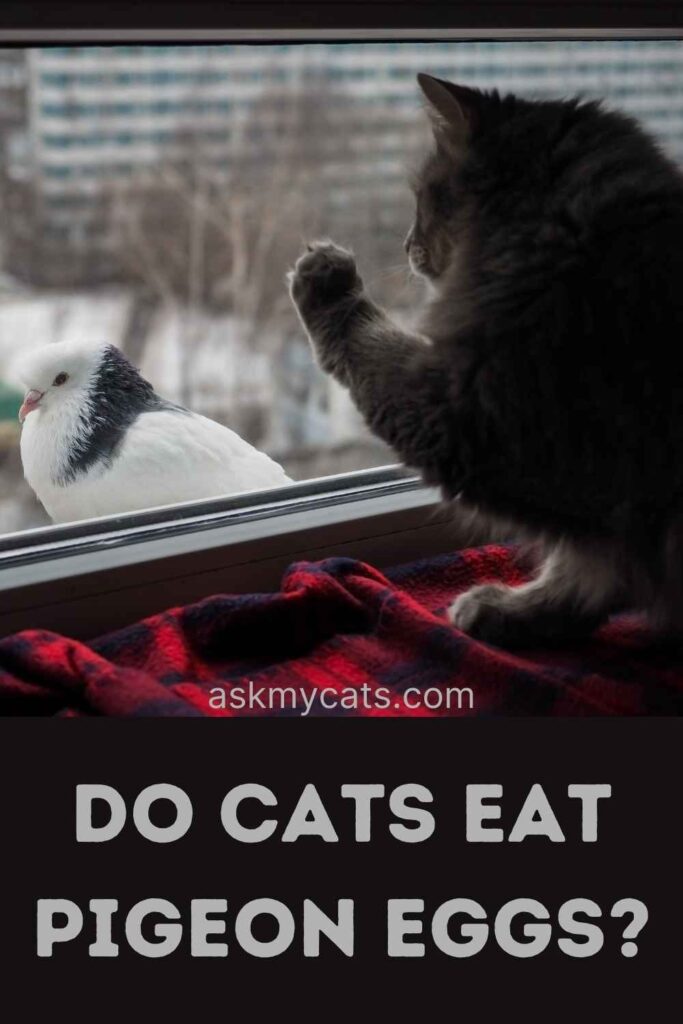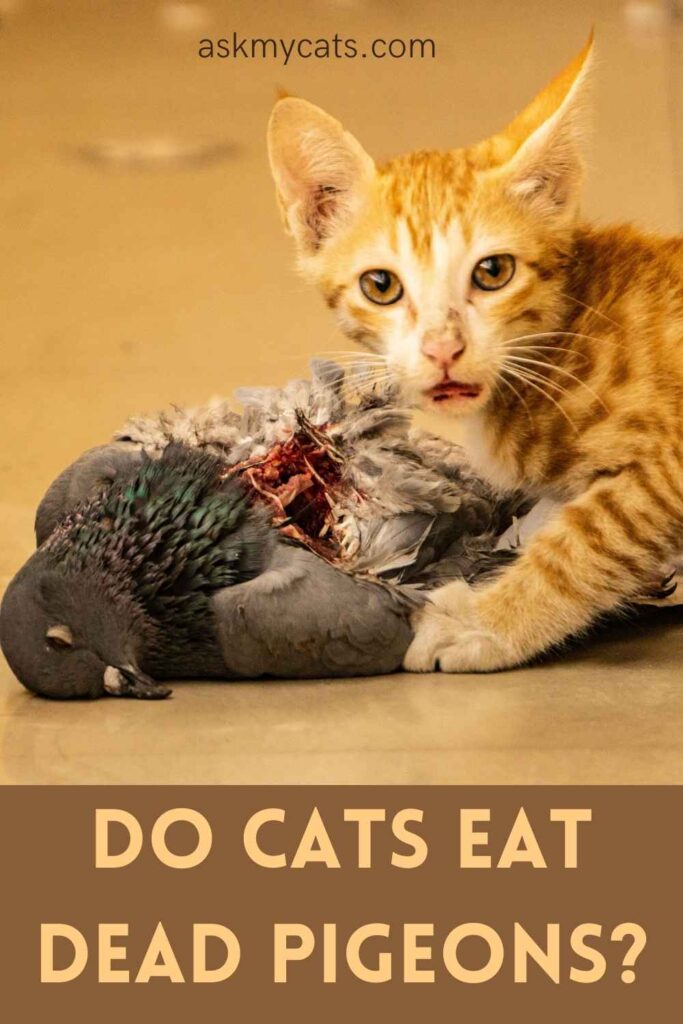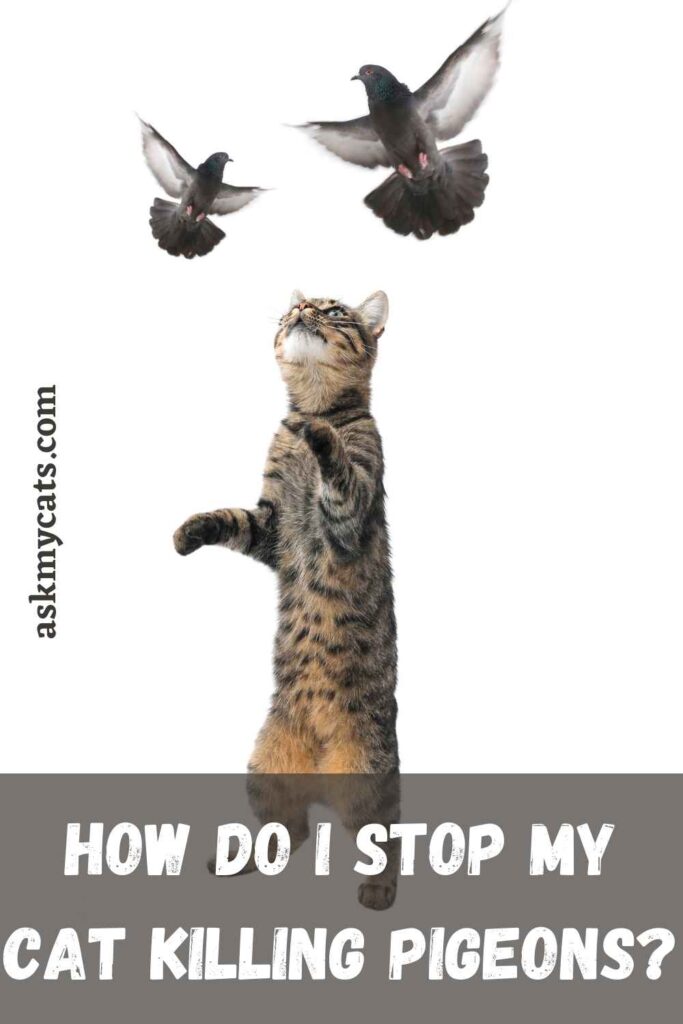Many of our feline friends like catching birds and rodents. If your cat consumes the birds it traps, there’s a possibility he’ll have stomach distress.
Birds do not provide the same health hazards as rodents, but they are not an ideal dietary source. It may be difficult to keep your cat from hunting outside if he or she is a hunter.
Cats can eat pigeons because they are mainly carnivorous animals, and they basically rely on meat based diet.
Now, let’s jump into the facts if cats genuinely eat pigeons or not and will also discuss about their hunting behaviors.


Give Your Cat the Perfect Day
Get the Free Ebook!
Do Cats Attack Pigeons?
Cats will frequently attack pigeons, especially if they are successful in catching the bird. They will continue to attack and intensify their attacks.
Cats in general prey on birds. They are predators who prey on birds and have a good track record of catching them because to their amazing speed and stealth.
Cats may be excellent companions, but when they are permitted to wander outdoors alone, they cause havoc with animals. And, contrary to common perception, cats do not hunt only for the purpose of obtaining food.
A well-fed “house” cat is just as likely as a hungry stray to take down a vulnerable bird learning to fly. Cats are predators, and they are hard-wired to be sneaky, vicious, and successful assassins.
There are some things you can do to help keep wild creatures safe if you have an outdoor cat and care about nature. Obviously, keeping cats indoors or in an enclosed outdoor space is the best solution.
You’ll be safeguarding your cats from automobiles, dangerous predators like coyotes, and some extremely serious illnesses that free-roaming animals may carry (some of which can even be passed on to you and your family!).
If you can’t or won’t keep your cat indoors, there are a variety of technologies you may use to at least reduce your cat’s hunting.
There are fancy collars and bells (though the effectiveness of bells is debatable at best), but even something as basic as a brightly colored scrunchy around the cat’s neck might help the would-be victim spot the cat sooner and give it time to flee (for anyone who missed the fad, this is a scrunchy).
Finally, avoid feeding wildlife if you have an outside cat. Bird feeders and baths are excellent for getting up and personal with wild birds, but if you have an outdoor cat, you’re effectively baiting these animals—especially if there are shrubs, trees, or other hiding spots nearby.
On a more optimistic note, it appears that our tiny patients will be given another chance at life. They’re eating and developing, and should be out in the wild by the end of the summer, presumably more careful of Fluffy this time.
Would A Cat Kill A Pigeon?
Cats are excellent hunters that can kill a lot of prey in a short amount of time. They will catch the pigeon and can easily kill it.
Domestic cats have distinct preferences for various sorts of food, according to research, and they will continue to seek favored species even when their numbers are low.
Even cats that are well-fed will hunt and kill. Most cat owners, if they think about it, have seen this behavior. A cat is practicing predatory tendencies while it plays with a feather toy or a laser. When similar actions are repeated outside, the consequences are fatal for birds and other animals.
The sheer presence of cats outside, however, is enough to have a major influence on pigeons. Because cats are well-known predators, their presence near breeding birds has been demonstrated to harm chicks’ health and impair nest success.
Do Cats Eat Pigeon Eggs?
Pigeon eggs are eaten by cats. They attack nests for both eggs and birds.

Cats do have heart disease, but they don’t get atherosclerosis as people do (which, in humans, was the source of the anti-cholesterol craze). In cats, there are two forms of cardiac disease.
Hypertrophic cardiomyopathy, for example, is primarily inherited and unrelated to one’s lifestyle (although feline obesity exacerbates it).
Dilated cardiomyopathy, on the other hand, is connected to a lack of taurine in the diet. Taurine supplementation in cat food has nearly totally eradicated this problem. Eggs, by the way, are a fantastic source of taurine.
Although eggs are extremely nutritious, they do not provide a cat with a comprehensive and balanced diet. It’s reasonable to anticipate a cat fed just eggs to have major nutritional deficits.
Cooked eggs are OK when given as treats, as a supplement to cat food, or as part of a customized diet designed by a veterinary nutritionist.
Raw eggs, on the other hand, are unique – in a way. Yes, germs can be found in them. However, egg whites contain avidin, a protein that binds biotin (also known as vitamin B7).
Biotin deficiency can be caused by consuming too much avidin. The avidin is denatured when it is cooked. As a result, only cooked eggs are suggested for cats.
To acquire such a deficit, a cat would have to consume a LOT of raw egg over a long period of time, possibly months or years. Is it really so awful to eat raw eggs? Most likely it is not the case here.
If you think giving your cat an egg once a day is reasonable, think again. In a 10-pound cat, one egg per day is about equivalent to 15 eggs per day in an average-sized adult person.
When more accurate calculations are made, one egg for a cat equates to roughly eight eggs for a person, owing to our different metabolic rates. That is not, in my opinion, moderation.
Do Cats Eat Dead Pigeons?
Cats are unlikely to consume carrion since they seldom eat pigeons that they haven’t hunted and killed (animals and birds that have been dead for a while).
When a cat becomes sick after eating a bird, it’s typically because the feathers and bones irritate the stomach.

Cats are easy prey for sick and dead pigeons. A cat that consumes a pigeon that has been delayed or killed by salmonellosis will be exposed to enormous quantities of germs, which can rapidly overcome the cat’s natural defenses.
Songbirds (cardinals, chickadees, finches, sparrows, and other birds) can become infected with Salmonella bacterium, much like many other species.
Some people get sick, while others become asymptomatic carriers, but they all shed the germs through their faeces. After coming into contact with these droppings, the illness might spread to other animals.
Ingested Salmonella is effectively eliminated via the gastrointestinal system. Because most germs die in the stomach’s acidic environment, it requires a very big dosage to cause an infection. Unfortunately, bird feeders provide the ideal habitat for the spread of Salmonella infections.
Cats are easy prey for sick and dead birds. A cat that consumes a bird that has been delayed or killed by salmonellosis will be exposed to enormous quantities of germs, which can rapidly overcome the cat’s natural defenses.
Songbird fever occurs when a cat gets a Salmonella infection after eating (or being suspected of eating) a bird.
Fever (obviously), tiredness, loss of appetite, bloody diarrhea, and vomiting are all symptoms of songbird fever.
Cats might be ill for a few days to a week or more. Up to 10% of people may die, particularly if they are very young, extremely elderly, or otherwise immunocompromised.
Supportive treatment (fluid therapy, anti-nausea medicines, etc.) and antibiotics, if the cat’s condition merits it, are used to treat songbird fever.
Songbird fever is not only terrible for the cats that get it, but it may also be dangerous for people who come into touch with them.
Cats with songbird fever can infect humans with Salmonella both while they are sick and for a long time thereafter. After a cat has recovered, the germs may be excreted from its digestive tract for three to six weeks.
Salmonella can also lurk in cells in the lymph nodes of the intestine, the spleen, and the liver. When these “carrier” cats become stressed or immuno-compromised, the bacteria might exploit the circumstance and reactivate, resulting in sickness and/or bacterial shedding.
Songbirds should not be eaten by cats for the sake of everyone’s health. Keep your pets inside at all times.
Can I Feed My Cat Pigeon?
Yes, a cat eating a pigeon is fairly safe and natural, especially when compared to rodents; however birds can also carry illnesses that might make your cat sick.
Pigeons can irritate or harm a person’s stomach if they eat them. Cats that kill and consume pigeons on a regular basis may endure vomiting, fever, and weight loss.
Pigeons are easy prey since they are soft. They stick together, making it considerably easier for a cat to trap a pigeon. Cats in general prey on birds. They are predators who prey on birds and have a good track record of catching them because to their amazing speed and stealth.
A single bite on the pigeon’s neck is enough to kill it. A pigeon does not require much effort on the part of cats. Cats will frequently attack pigeons, especially if they are successful in catching the bird.
They will continue to attack and intensify their attacks. They may be quite obstinate, making it extremely difficult to keep them at bay.
How Do I Stop My Cat Killing Pigeons?
It won’t be simple since the cats will keep attacking the pigeons until they get your birds.
Cats are excellent predators that can discreetly take your pigeons away. A single minute of inattention may cost your pigeons a lot of money. They know when and how to attack, and once they’ve decided on a target, they’re nearly unstoppable.
So, here are some methods for keeping cats at bay:

1. Make A Scare Crow
This is the most effective method. Installing a scarecrow wherever your pigeons are can terrify the cats so much that they will think twice before attacking or will not attack at all.
This method will work flawlessly for a short period of time until the cat realizes it is a ruse.
2. Make Use of Ultrasonic Sound
Ultrasonic noises are sounds that humans cannot hear but that cats can. The cat will be startled by such a high-frequency sound and will flee rather than fight.
They won’t attack in the first place since they can’t handle such high-frequency noises.
3. Spray Water
If you observe a cat approaching your pigeons, simply toss some water at them. The cat will just come to a halt and flee.
Cats despise water. As a result, water is an excellent deterrent for cats.
4. Dogs V/s Cats
Cats are natural enemies of dogs, therefore if you have dogs in your house or garden, there’s a good chance your garden or home won’t be attacked by cats. They will most likely seek an alternative and may go to another location to satisfy their desire.
Yes, there have been assaults even after you retain dogs, since, as I previously stated, cats are skilled predators that can detect when the dog is asleep or unaware and then strike, catching their victim and fleeing.
However, this is one of the greatest ways to safeguard your pigeons and will greatly minimize the likelihood of a cat attack. Also, there’s a chance you won’t observe any cat attacks at all.
Frequently Asked Questions:
Do domestic cats kill pigeons?
Domestic cat predation is the most significant direct human-caused danger to birds in the United States and Canada. Outdoor cats kill over 2.4 billion birds each year in the United States alone. This figure may appear incredible, yet it reflects the effect of tens of millions of outdoor cats.
Do cats kill pigeons for fun?
If they have lived together since they were young, a cat will not murder a pigeon. Yes, whether you’re talking about a wild cat or your next-door neighbor’s cat. Birds and cats do not get along. If the cat captures the pigeon for amusement or food, it will kill it.
Are pigeons afraid of cats?
Cats are one of the most skilled predators out there. They have the predatory instincts of a lion and tiger, meaning they chase the prey like lions and tigers or get closer to the prey silently. When it comes to preying on pigeons, cats find it easy to attack pigeons and capture them.
Final Words
Cats are suspicious creatures that are afraid of humans, so they won’t attack while you’re feeding them, but they may attack if they’re desperate.
They will try to catch the pigeons as quickly as possible and then escape the area with the birds in their mouths. If they are unsuccessful in their initial effort, they may assault once or twice more, and if they are still unsuccessful, they will flee.
Do you have any comments or questions? We’d love to hear from you! Drop them in the comments section below now!

I have a approx. 14 y.old Bombay black cat and live in a city environment, in a flat with the whole cortyard
of the building practically mine, as noone uses it. The flat above me is empty. The local pigeons have seen that they can rest on the balcony and cortyard (my entrance door is directly from the yard and most time closed). Even when she was younger, she showed interest for hunting pigeons. Well, today, she got one there, served, for lunch, sleeping in the yard, and quickly ran to get in kind of “See what I got”. Seeing her running in my direction, I quickly closed the door, telling her NO NO. Whenever I am on the laptop, she’s on the table to get warm vith the heat coming out. Well, I don’t want diseases at least on the table. After I threw the pigeon in the trash, using gloves, I washed with water and soap in front of the entrance door, but “how do I wash the cat”. Joking, of course.
Hello Leo,
Thanks for sharing your story.
Yes, the cat has very good hunters and they often tend to show off their skills to us.
I think you have taken very good measures already to safeguard from any kind of infection.
Stay safe.
Happy Cat Parenting